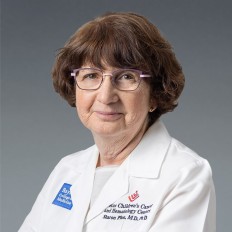Texas Children’s Hospital Leads the Future of Pediatric Cancer Care with Precision Oncology


Nearly all cancer programs seek to deliver highly individualized, targeted care. But Texas Children’s Hospital takes personalized care to the molecular level: The Center for Precision Oncology at Texas Children’s Cancer Center uses the unique tumor and its genetic mutations for each child to help guide cancer treatment.

The center’s team, led by director Dr. Will Parsons, is a world leader in cancer genetics research, providing a foundation for improving personalized treatment for all children with cancer.
“Through advances in molecular testing methods for children with cancers that have not responded to standard treatments, we’re working to positively impact their lives through innovative clinical trials,” said Dr. Parsons. “Through advances in precision oncology, we use drugs aimed at the specific changes causing an individual child’s tumor.”
Over the past decade, the Center for Precision Oncology at Texas Children’s Cancer Center has led revolutionary research with dramatic impacts on patient care. By identifying previously unknown genetic mutations in tumors, the team has contributed to improvements in both diagnosis and treatment selection for children with rare and hard-to-treat cancers. As one example, a recent study of children with MYOD1-mutant sarcomas found molecular targets for therapy (using either FDA-approved or investigational treatments) in more than 80% of tumors that were analyzed.

Dr. Parsons also serves as co-principal investigator of the Texas KidsCanSeq clinical trial with Dr. Sharon Plon, who leads the Cancer Genetics and Genomics Program at Texas Children’s. KidsCanSeq is an NIH -funded study aimed at learning how comprehensive genetic testing for children with cancer can improve care and how this testing can improve the care of their families when inherited cancer syndromes are identified. Collaborating with a large team including the Baylor College of Medicine’s Whole Genome Laboratory and Texas Children’s Department of Pathology, study investigators are comparing the utility of multiple different types of molecular testing (including new tests developed at Texas Children’s) for pediatric cancer patients. After completing enrollment in August 2021, which included more than 600 patients, 900 parents and 80 oncologists across Texas, the team is now focused on analyzing the molecular and clinical data to help guide future genetic testing strategies.
As a result of the team’s expertise, Texas Children’s precision oncology researchers have had the opportunity to work with a national Children’s Oncology Group (COG) team to lead the NCI-COG Pediatric MATCH trial, the first nationwide precision oncology trial. In the Pediatric MATCH trial, children and young adults with hard-to-treat cancers are “matched” to new molecularly targeted therapies based on the specific mutations in each patient’s tumor. To date, more than 1,300 children and adolescents have been enrolled from 130 hospitals across the U.S. Preliminary data presented by Dr. Parsons at the 2021 American Society for Clinical Oncology (ASCO) annual meeting reported a “match” to a trial in nearly 30% of patients whose tumors were analyzed. The trial results of the first drug tested in the trial (the MEK inhibitor selumetinib) were also reported at ASCO with results of the remaining 12 drug trials to follow over the next several years.
For Dr. Parsons’ team, using research to drive direct patient impact is always front and center. In addition to developing new clinical genetic tests for high-risk treatments, the center’s Precision Oncology Consultation Service offers genetic testing of blood and tumors to physicians throughout the U.S., consulting with them on challenging patient cases. Texas Children’s Cancer Center clinicians with genomic and tumor-specific expertise use this data to better understand the potential vulnerabilities of rare, relapsed, and/or refractory tumors in order to identify potential treatment strategies. The service also works with its national network to identify clinical trials using experimental therapeutics that exploit specific vulnerabilities within tumors and/or coordinate molecular tumor profiling to determine clinical trial eligibility.
“We’ve worked hard to develop innovative molecular testing, but equally importantly we are trying to determine how to best use those tests to improve diagnosis and treatment for our patients and their families. We’re always asking ourselves ‘How can we best use this new information and make it most useful?’” Dr. Parsons said. “Our team spends a lot of time helping physicians throughout the country interpret testing results and strategizing with them about specific treatment or trial options.”
Learn more about the use of precision oncology at Texas Children’s Hospital or call 1-800-226-2379 to consult with the Center for Precision Oncology team.